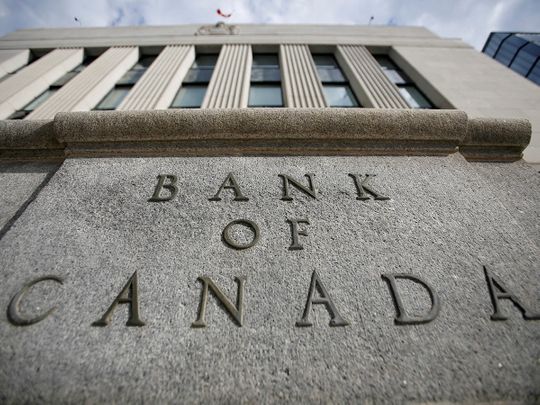
The Bank of Canada held interest rates steady for a third consecutive meeting, acknowledging a stalled economy while keeping the door open to further hikes as they watch for more progress on slowing inflation.
Policymakers led by Governor Tiff Macklem left the benchmark overnight rate unchanged at 5 per cent on Wednesday, the highest level in 22 years. The pause was expected by markets and by economists in a Bloomberg survey.
Officials say recent data suggest the economy is no longer in "excess demand" and their hiking campaign is dampening spending and price pressures. They eliminated a line from the October decision that said inflationary risks have increased, but said they're prepared to raise borrowing costs again if necessary.
"Governing council is still concerned about the risks to the outlook for inflation and remains prepared to raise the policy rate further if needed," the bank said, adding that they want to see "further and sustained easing in core inflation."
The more neutral language in the statement suggests policymakers are increasingly confident interest rates are restrictive enough to bring inflation back to the 2 per cent target. Still, officials will want to see more progress on core inflation, which strips out the effect of more volatile items, before declaring victory.
Before Wednesday's decision, traders in overnight swaps were betting the bank would start cutting borrowing costs by the April meeting and lower the benchmark overnight rate to 4 per cent by the end of 2024.
Canada's economy has stalled and consumption is weak.
The unemployment rate has risen to 5.8 from 5 per cent in just seven months, a loosening of the labor market that typically coincides with recessions. Just six weeks ago, the bank said the labor market remained "on the tight side," but acknowledged on Wednesday they see it loosening.
After temporarily reversing course due to rising gasoline costs, inflation decelerated to a 3.1% yearly pace in October. "The slowdown in the economy is reducing inflationary pressures in a broadening range of goods and services prices," the bank said.
Deputy Governor Toni Gravelle will expand on the central bank's thinking on Thursday, when he is set to deliver a speech and take questions from reporters.
While most economists believe a soft landing is still the base-case scenario for the economy, key vulnerabilities in the country's financial system are about to be tested. Canada's highly indebted households carry shorter-duration mortgages that roll over more quickly than their counterparts in the US, and 82 per cent of economists say that represents a major downside risk to the economy.
Prematurely declaring victory over inflation, only to have to restart rate hikes later, would be a knock to the central bank's credibility. Headline inflation has been above the Bank of Canada's 1 to 3 per cent control range for 30 of the last 31 months - the worst record in the modern era of the central bank - and more than half of economists surveyed by Bloomberg say that has hurt the bank's reputation.








